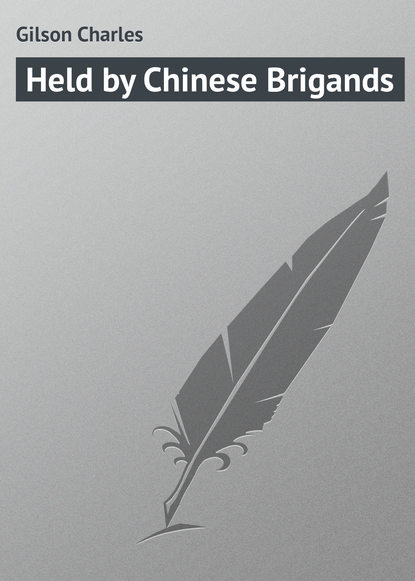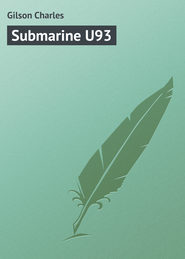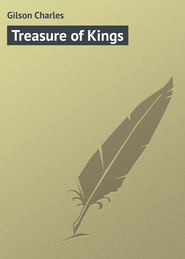По всем вопросам обращайтесь на: info@litportal.ru
(©) 2003-2025.
✖
Held by Chinese Brigands
Настройки чтения
Размер шрифта
Высота строк
Поля
"And you shall wait on me," he declared. "I have heard it said that you have a great reputation in Hong-Kong, that you squeeze even ricksha coolies for copper cash and make more money than a comprador. You shall attend to my wants; and when I have eaten all that I desire, you shall-as I promised you-wash up the bowls and plates."
Presently one of Ah Wu's assistants mounted the staircase, carrying in his hands a large tray upon which was a number of Chinese dishes. The tray was set down upon a small table at which Yung How was ordered to preside, handing the mighty Ling whatever dish he might call for.
Now Yung How had made up his mind to escape, and even as he waited upon Ling he took careful stock of his surroundings. He knew that he could not rely upon any help from Ah Wu, who was now hand and glove with the Honanese. He had noticed that Ah Wu had locked the back door, putting the key in one of his pockets. There was a clock in the room, towards which Yung How repeatedly carried his eyes. It was twenty minutes to eight. Yung How had, indeed, very little time if he was to make good his escape and catch the Hong-Kong boat. He could not very well cross the room, and go out by the main entrance, because Ling would certainly see him and follow in pursuit. The man was beginning to despair when he observed a window at the farther end of the balcony.
This window was closed, but it might be possible to open it. Also, since the floor of the lower room was somewhat below the level of the street, the window could not be far from the ground. The difficulty that confronted Yung How was how to reach the window without arousing the suspicions of Ling.
Now Yung How, like the majority of his countrymen, was by no means devoid of inventive powers. The Chinaman is an adept at finding an excuse, and it must be confessed that the device of Yung How was ingenious.
In handing a small bowl of rice to Ling, the man purposely knocked over the small opium spirit-lamp which stood burning upon the table by the side of the couch upon which Ling was lying. This nearly resulted in a general conflagration that might have destroyed the whole establishment. The oil ran out, and set fire to the dry matting with which the floors were carpeted; and this burned like tinder-wood, the fire running with rapidity along the balcony and filling the whole place with smoke.
Ling, springing to his feet, utilised one of the cushions of the couch to smother the fire. Frank was not slow to follow his example, and Ah Wu and several men from the lower room, hastening up the steps, resorted to various means to quench the fire, or at least to hold it in check.
For the best part of a minute the whole place was uproar and confusion. Those who were already asleep from the effects of opium were awakened by cries of "Fire!" One or two in alarm left the establishment by the main entrance, spreading the report in the city that Ah Wu's opium den had actually been burned to the ground.
Long before that Yung How had made the most of his opportunity. At the moment when the danger was most imminent, when the attention of both Ling and Ah Wu was fully engaged, the man passed unseen to the window, which he opened. Leaning over the sill and looking down, he satisfied himself that it was not more than twelve feet to the ground. As quick as thought he crawled through, hung for a moment at the full extent of his arms, and then dropped to the street. Instantly he set off running as fast as he could in the direction of Shamien.
When the fire was extinguished, Ling gave vent to his feelings, cursing Yung How for his carelessness and folly. However, he had not unburdened himself of more than a few sentences when, to his astonishment and indescribable wrath, he discovered that Yung How was gone. Seeing the opened window, he rushed to it, and looked out. Beyond there was nothing but darkness, an unlighted by-street, not more than two or three yards in width.
Ling descended the stairs like an infuriated tiger. Quite suddenly he came to a halt in the middle of the room. Thence he returned up the staircase, four steps at a time, at the top of which he encountered Frank. He seized the boy by the throat, and then, lifting him off his feet, tucked him under an arm, as a man might carry a hen.
He again descended the stairs, unlocked the door of the little room, threw the boy inside, and locked the door upon him. A moment later, he was in the street, rushing forward at such a tempestuous rate that he cleared all obstructions from his path. He thrust an empty ricksha aside with such violence that he broke the shafts. He knocked over three men: a fat old merchant, a beggar, and a blind man. He killed a duck by crushing it underfoot, and finding his way barred by a pig, he picked it up and threw it over a wall, the animal squealing in terror.
Gaining the narrow creek that separates Shamien from the main part of the city, Ling dashed across the bridge of boats. That night the few Europeans who were walking along the bund in front of the hotel and the club beheld the remarkable apparition of a Chinese giant who charged forward like a madman, his long pigtail flying out behind him, making in the direction of the harbour.
On a sudden, Ling stopped dead. His headlong course had been arrested by a peculiar sound, or rather combination of sounds, the explanation of which was not difficult to seek. There was the shrill whistle of a siren and the sound of large paddles violently thrashing the water.
Almost at once, the Hong-Kong boat hove in sight. The decks were ablaze with light. Upon the bridge, Ling could distinguish both the Chinese pilot and the English captain.
"Hi!" he shouted. "I have missed the ship. If you slow down and lower a rope I can come on board from a sampan."
He spoke in excellent English. There is no doubt that the captain both heard and understood him, for Ling received his answer.
"Too late, my friend!" shouted the captain. "We sail to time, and if you're not here it's your own fault. You'll have to wait till to-morrow-eight o'clock in the morning."
Ling's answer was neither in the English language nor at the top of his voice. It was in Cantonese, and as a matter of fact it cannot be translated. And if it could be translated, no one would print it. For Ling had not failed to observe Yung How, standing alone upon the upper deck.
CHAPTER XVIII-OF THE SPIDER AND THE WEB
When Frank was thrown into the little room beneath the stairs, and heard the key turn upon him, he at first believed himself to be in utter darkness. But very soon his eyes became accustomed to the dim light that emanated from several cracks in the woodwork.
These cracks were in the stairs that led from the lower room to the balcony. The opium den was, of course, well illumined by several paraffin lamps. The little room in which Frank was imprisoned extended from the foot of the staircase to the back wall, the staircase itself forming the ceiling, which was in consequence only about three feet high at one end of the room, and about twelve feet high at the other. Now it so happened that the largest crack was at the lower end of the room, and Frank Armitage was not slow to discover that, by placing his eye to this, he could see quite easily into the opium den.
When he looked into the outer room he was able to observe several opium smokers, and Ah Wu himself, who was seated at his desk at the doorway. There was, however, no sign of Ling, and Frank rightly concluded that the Honanese must have left the establishment in pursuit of Yung How.
There could be no doubt upon this point; for not only could the boy see, but he was able to hear quite distinctly, the woodwork of which the small room was constructed being extraordinarily thin. If Ling had been either upon the balcony or in the lower room Frank must have heard him; for the man seldom spoke without raising his voice to such a pitch that he might have been giving a word of command to a regiment of cavalry.
Fully an hour elapsed before the Honanese returned. He was then in a towering rage. He called for Ah Wu, who chanced to be absent in the kitchen. Frank heard Ling inform the proprietor of the opium den that Yung How had escaped on the Hong-Kong boat. Both men then repaired to Ah Wu's private apartments, where they remained for the greater part of the night, Ah Wu occasionally looking in upon the opium den to see that his business prospered.
Until about eleven o'clock the following morning, Frank Armitage was left to his thoughts; and these were none of the pleasantest. He was suffering considerable discomfort. It was a long time since he had had any food; and the great heat and stifling atmosphere of the opium den, together with the pungent smell of the smoke, had served to make him so thirsty that his lips were dry and his tongue clave to the roof of his mouth. He regretted bitterly that he had not been able to escape with Yung How. He felt that he could not stand the extreme suspense of his situation much longer. It seemed to him inevitable that before long Ling would discover who he was.
This was all the more probable, since-according to Ling-Cheong-Chau himself was coming to the opium den. The brigand would be far more likely than anyone else to recognise Frank-because he knew which of his prisoners had escaped, and had evidently come south in order to hunt for the fugitive.
Frank was seized with a great dread that Cheong-Chau had already made away with his other prisoners, that he had murdered both Sir Thomas Armitage and Mr Waldron. There was a possibility, on the other hand, that he had brought his captives with him, which he might have done quite easily on board a river-junk. Knowing full well that he could not hope to obtain the ransom if Sir Thomas and Mr Waldron were known to be dead, he may have decided to send further evidence to Hong-Kong to the effect that his hostages were still alive. On thinking the matter over, Frank was inclined to the belief that this was what had actually happened.
There was another aspect of the business which demanded consideration. It was now Cheong-Chau's intention to go himself to the Glade of Children's Tears, in order to procure the money as soon as it arrived. This, as we know, was a privilege that the mighty Ling had chosen to reserve for himself; and so a meeting between these two redoubtable villains was sooner or later inevitable. Cheong-Chau would have upon his side the advantage of numbers. Ling, on the other hand, was in possession of the more accurate information: he knew Cheong-Chau's whereabouts and his intentions, whilst Cheong-Chau knew nothing about him; he knew also that Yung How had escaped to Hong-Kong and that intervention by the British was by no means improbable-a circumstance of which the brigand chieftain remained in ignorance.
That night Frank endeavoured to work out every possible contingency, until his brain grew dizzy with thinking. At last, dead tired, feeling sick with suspense, hunger and thirst, with such a splitting headache resulting from the foul atmosphere of the den that he could hardly open his eyes, he flung himself down upon the couch and almost at once fell fast asleep.
In the boy's last waking thoughts he found some degree of comfort. He had come to realise that he himself could do nothing. He was at the mercy of fate, in the hands of Providence-just as helpless as a wisp of straw carried down-stream upon the current of a river. So far as his own safety was concerned, he had come to such a pass that it might almost be said that he no longer regarded it. To himself it did not seem a matter of supreme importance whether he lived or died. He had not given up hope, but physical exhaustion and mental strain had done their work.
During the earlier hours of the night his sleep was disturbed and restless. He was conscious all the time of the voices of men talking in the outer room, and these voices were in some way mingled with his dreams, which were nothing but a series of nightmares, in which the sinister figure of the colossal Ling was ever present-Ling with his great hands and brute strength, his long glistening pigtail, his evil, snake-like eyes, his rude jokes, his loud laughter, and the half-mocking, half-serious manner in which he quoted from the writings of the great Chinese philosophers. But, given a fair chance, a sane, healthy and youthful constitution will in the end triumph over both mental and bodily disorders, and towards the small hours of the morning the boy fell into a heavy, dreamless sleep, from which he was not awakened until Ling unlocked the door of the little room about eleven o'clock in the morning.
The Honanese regarded his captive for some moments without speaking.
"You have slept well?" he asked.
"I have slept well," said Frank.
"They say," said Ling, "that sound sleep is a sign of a pure conscience. I myself am in the habit of sleeping like a child. And yet," he added, in a doubtful voice, "I am half of opinion that I ought to put you out of the world."
"You are free to do as you wish," said Frank.
"I thank you," said Ling. "I am aware of it."
"At the same time," said the other, "I beg to remind you that I am not here of my own free will. I did not ask to accompany you; you can scarcely say that I intruded. You kidnapped me and demanded that I should assist you. I did so to the best of my ability. I confess I had no other alternative. That does not alter the fact that had you left me to mind my own affairs I should not have interfered with you. You told me a great deal about yourself. I did not ask you to. You brought me here, where in my presence you committed a crime-"
"No, no," Ling interposed. "You do me a great injustice. I have committed no crime. I did but defend my life. I usually do so with success."
"Have it your own way," said Frank, who now-for some reason or other-felt bolder in the man's presence that he had ever felt before. "It is not a matter that concerns me. A few days ago I had neither seen nor heard of you. It was a misfortune for me that I encountered you that morning upon the wharf at Sanshui. You have no right to detain me. I have no valuables upon me, but a few copper cash. If you want them you can take them. You are welcome to what I have. I ask but one thing: to be allowed to go free, to go about my own affairs."
"That is well spoken," said Ling. "I admit I am fond of you. I think I have told you already that I have admitted you into the innermost chamber of my heart. Had I a son, I would that he were such as you. I would bring him up in the way that he should go. I would not entrust his education to the literati of China. I would teach him myself."
"To be a robber?" asked Frank.
"Robbery," said Ling, "is a profession. I think that education should be regarded merely as a groundwork, a kind of foundation upon which to build. A man should be left to discover his own talents. His natural inclinations will not lead him astray. One man will make a good priest, another a good pirate. An excellent scroff may make a fool of himself as a schoolmaster. You cannot grow mangoes upon a cherry-tree, neither will a river fish live in the salt water. I would teach you, my son, the divine philosophies of China; I would instruct you in astronomy, music and mathematics. Then, when you were grown up, you would be able to fend for yourself. It would be all one to me whether you were a government prefect, a mandarin of the Red Button, or a brigand like Cheong-Chau, whom I hope to meet this evening."
"I see," said Frank, "that you would confer many favours upon my humble self. I ask but one small boon-to be allowed to go away from this place where you have thought fit to imprison me."
"And that is the one request," said Ling, "that I am unable to grant. It so happens that I want you."
"Why?"
"Our friend, Ah Wu, has gone away. He has gone upon a visit to Cheong-Chau. Cheong-Chau and he are old friends; they are brother pigs, who have eaten many a time from the same trough. Ah Wu will bring Cheong-Chau here. Cheong-Chau is a great opium smoker, and, as all Canton is well aware, no better opium can be obtained in the city than that which is sold by Ah Wu. So Cheong-Chau will come."
"And what has this to do with me?' asked Frank.
"It has a great deal to do with you," said the other, "for, in the meantime, I am left in charge of this establishment; hence, for the second time, I need your assistance. Cheong-Chau knows me very well by sight. He would not remain in this place two seconds if he saw me when he entered. Therefore, once again, I must hide."









